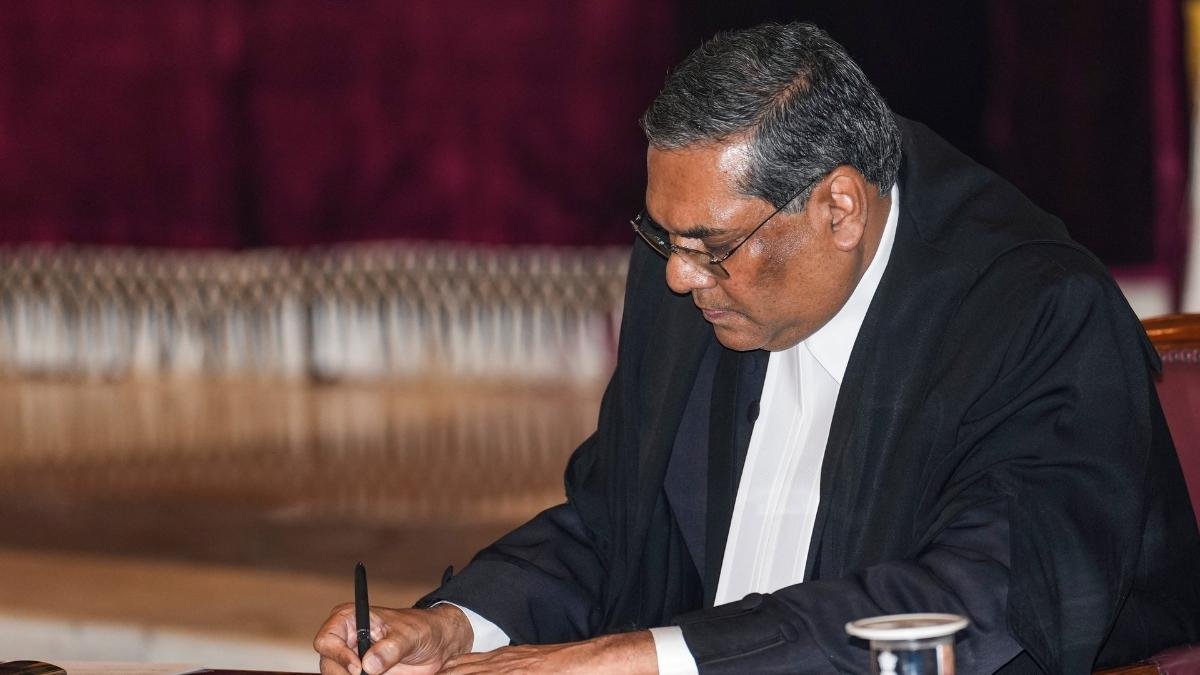New Delhi: Chief Justice of India (CJI) Sanjiv Khanna is set to retire on Tuesday upon reaching the age of 65, bringing an end to his tenure as the 51st CJI, which began on 11 November last year. His time in office, though brief, saw significant rulings on issues ranging from constitutional matters to electoral reforms.
With Justice BR Gavai set to take over as the 52nd CJI, here’s a look at some of the major decisions and observations delivered by Justice Khanna during his tenure at the Supreme Court and before.
- Places of Worship Act: Interim protection from fresh suits
In December 2024, a Special Bench led by CJI Khanna issued an interim order stating that no new suits under the Places of Worship Act would be entertained, and no final or effective orders would be passed in pending cases. The matter involved petitions challenging certain provisions of the law that restrict changes to the religious character of places of worship as they stood on 15 August 1947.
- Waqf Act: No immediate order amid centre’s assurance
While hearing petitions against the Waqf (Amendment) Act, 2025, the Bench headed by CJI Khanna noted the Union government’s assurance that it would not de-notify provisions related to ‘waqf by user’ or include non-Muslims in the Waqf Board. Given his impending retirement, Justice Khanna opted not to reserve judgment and directed that the matter be placed before a Bench led by Justice Gavai.
- Remarks by BJP MP: Court declines PIL but slams irresponsible comments
A Bench led by Justice Khanna refused to entertain a PIL seeking contempt proceedings against BJP MP Nishikant Dubey for controversial remarks against the judiciary. However, the Bench, also comprising Justice Sanjay Kumar, criticised the statements, calling them “highly irresponsible” and noted their potential to “scandalise and lower the authority” of the Supreme Court.
The court emphasised the need to act firmly against hate speech:
“Hate speech cannot be tolerated as it leads to loss of dignity and self-worth of the targeted group members, contributes to disharmony amongst groups, and erodes tolerance and open-mindedness, which is a must for a multi-cultural society committed to the idea of equality,” the court said.
- EVM-VVPAT verdict: No to 100% tallying
Justice Khanna, leading a Bench with Justice Dipankar Datta, ruled that while voters have the right to ensure their vote is properly recorded, this does not extend to a right for 100 percent VVPAT slip counting or physical access to the slips.
The court rejected a return to the ballot paper system, calling it “foible and unsound” and highlighted the risks of misuse and malpractices with physical VVPAT slip access.
- Interim bail to Arvind Kejriwal: liberty and limits
On 12 July 2023, Justice Khanna’s Bench granted interim bail to then Delhi Chief Minister Arvind Kejriwal, noting:
“Right to life and liberty is sacrosanct” and Kejriwal had already been in custody for over 90 days.
The court, while not directing him to step down, suggested Kejriwal should consider his position as CM, saying:
“We are conscious that Arvind Kejriwal is an elected leader and the Chief Minister of Delhi, a post holding importance and influence… We leave it to Arvind Kejriwal to take a call.”
The case was referred to a larger Bench for further examination of the legal questions surrounding his arrest and remand.
- Lok Sabha elections: Temporary relief for Kejriwal
In the run-up to the 2024 general elections, Justice Khanna granted 21-day interim bail to Kejriwal in the money laundering case. He was instructed to surrender on 2 June and barred from visiting his office or signing official files, unless it was essential for Lt Governor approval. The Bench stressed this was not a comment on the merits of the case.
- Electoral bonds scheme: Struck down for lack of transparency
CJI Khanna, part of the Constitution Bench that unanimously struck down the electoral bonds scheme, authored a separate concurring opinion. He concluded the scheme did not pass the proportionality test due to the lack of transparency in political funding.
He clarified that he relied on publicly available data from the Election Commission and petitioners, without opening the sealed envelope submitted by the EC.
He also noted that most of the contributions via electoral bonds had gone to ruling parties at both Centre and state levels.
- Article 370: Abrogation upheld, federal structure intact
In the verdict on the abrogation of Article 370, Justice Khanna concurred with the majority and said:
“Article 370 was enacted as a transitional provision and did not have a permanent character.”
He added that the move did not compromise India’s federal structure, as people of Jammu and Kashmir enjoy the same rights as those in the rest of the country.
The Bench directed the Election Commission to conduct Assembly elections in J&K by 30 September 2024 and urged swift restoration of statehood.
In May 2024, the Supreme Court dismissed review petitions challenging the verdict.
Legacy of judicial balance
Justice Khanna’s career at the apex court was marked by reasoned restraint and careful consideration of constitutional principles. His judgments reflect a balance between individual rights and institutional integrity, especially in politically sensitive cases.
IANS inputs


